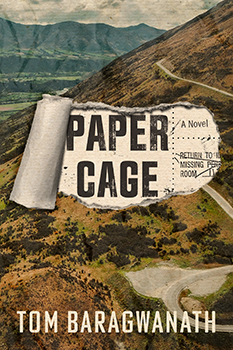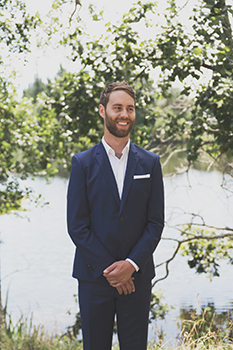Claustrophobia, Mutual Surveillance, and Missing Kids
The Big Thrill Interviews Debut Author Tom Baragwanath
 In Tom Baragwanath’s compelling debut novel PAPER CAGE, Lorraine Henry, a records clerk for the local police, takes on the role of investigator when her young nephew joins a growing list of children who’ve gone missing from the small town of Masterton, New Zealand. Originally from Masterton, Baragwanath now lives in Paris with his wife—who he met at university in Wellington—and young son.
In Tom Baragwanath’s compelling debut novel PAPER CAGE, Lorraine Henry, a records clerk for the local police, takes on the role of investigator when her young nephew joins a growing list of children who’ve gone missing from the small town of Masterton, New Zealand. Originally from Masterton, Baragwanath now lives in Paris with his wife—who he met at university in Wellington—and young son.
Tell us about growing up in New Zealand.
I grew up in Wainuioru, a farming community about half hour’s drive from Masterton. It’s really in the sticks, meaning we’d shop for groceries once a week and avoid going into town too often. The place has a real sense of isolation about it, both physically and socially. In times of flood, the single gravel road leading to our house would be cut off from the outside world, meaning we’d need to stay put for days at a time. You can go a long while without seeing anyone besides your immediate family and a handful of neighbors. It’s a tight community, but also one where people are paying a lot of attention to each other and keeping tabs for good or ill. I really wanted to capture this sense of claustrophobia and mutual surveillance in PAPER CAGE.
Tell us about your family.
I have a bunch of younger siblings, both on the side of my mother and my stepfather, and also my father and stepmother. Both sides of my family work in the rural sector, either raising sheep and cattle directly or managing grazing operations and developing national educational standards for agricultural training. My mother and father actually met in a shearing gang, which also has a certain echo in the book.
What was your relationship to books and reading?

I was always a huge reader and probably annoyingly competitive academically. As you can imagine, in a rural school in New Zealand, a lot of our focus at that age was on being outdoors, either playing rugby, tramping (hiking), or just mucking around in the bush. I spent a good chunk of my time outdoors with my younger cousins, getting up to mischief. It sounds almost cliché, but I knew from the first moment I can remember holding a book in my hands that stories were my favorite thing.
My late grandmother lived in Featherston (another location in PAPER CAGE) and was something of a book collector. My earliest memories are of her reading to me—adventure stories, detective novels, classic sci-fi, microwave cookbooks—from the inexhaustible pile of books in her house. I read so often with my Nan that from a young age, I knew stories were things to take seriously, and I was constantly writing my own stories, either in class or at home.
When did you start to take writing seriously?
I studied law and political science at university in Wellington and worked in government policy and consulting in my twenties. I spent pretty much all my free time working my way through the classics and writing short stories, aping whoever I was obsessed with at the time—Murakami, Carver, Paley, Barthelme. I always wondered what it might be like to work on longer fiction, and when my wife and I moved to France in my early thirties, I had the chance to find out. I wrote a handful of novels before completing an MA in creative writing at the University of Kent’s Paris campus, which is when I began work on PAPER CAGE.
Has living in Paris had any effect on your writing?
We moved here to take advantage of my British citizenship before Brexit took effect. My wife and I both have family on this side of the world (France and the UK), and we always wanted to try living here for a little while. A little while has turned into a longer while. The move has definitely affected not just my writing but my reading, too. The French ascribe a level of value to fiction that’s quite validating as an aspiring writer; not to say this attitude is any different in New Zealand, but you can describe yourself as a writer in French company, and you don’t get so many probing questions about what you really plan on doing to pay the rent.
Living in France also means I can work in cafés without being so distracted by the chatter around me because I understand less of it. One other key difference is the number of people you see reading in public here, either in bars or on the metro. Back in Wellington, I had to be quite stealthy about going out for a pint with my book, otherwise people would wonder why I was on my own. Here, it’s an entirely normal thing to spend an hour or two on a terrace by yourself.
What was the genesis of PAPER CAGE?
I started working seriously on short fiction in my mid-twenties. It was a way of figuring out how stories worked and how to approach an idea or situation so it might spark something in the reader. PAPER CAGE was an attempt at working on something longer. Looking back, it’s blindingly obvious I was working on a crime novel because the engine of the story is a series of missing kids. What I was truly interested in were the things that made my protagonist, Lorraine, and the people around her singularly interesting.
Now that I’m a little more comfortable with being labeled a writer of crime fiction, I can see the thread of crime fiction running through many of my favorite contemporary writers: Ottessa Moshfegh, Paul Auster, and Lucy Ellmann (though she’d take exception to that association, I’m sure).
Tell us about the genesis of PAPER CAGE.
It started as a series of stream-of-consciousness monologues in the voice of Lorraine Henry: ruminations on family, the biscuit selection in the police station tea room, and her commentary on the case files she was processing. I knew I had something when I could sit down with my pen in front of a blank sheet of paper, and she would simply talk back to me. Once I had the idea of missing children and a particular abduction affecting her own family, I could see where the book might go.
That’s when I turned to Robert McKee, John Truby, and Stephen Koch for guidance on the structural elements of the story, and I made a loose map for the shape of the book. The setting came early. I was homesick during the pandemic, so writing a story set in Masterton wasn’t just a way to access a familiar place but also a balm for some of those challenging feelings. I’ve always been fascinated with a particular kind of Pākehā paternalism towards Māori communities, and I wanted the chance to poke at it and see where it comes from, what it means, and the shape it might take when stretched to its extreme.
Why Lorraine as the narrator?
Lorraine’s voice was the first thing that felt real about the story, so it was natural that she’d be the narrator. I love how the close first-person narration gives you the chance to give the reader information obliquely through omission. I tried working on the story using a third-person point of view, and it seemed uncharitable, almost mean like I was taking stock of Masterton and its inhabitants without being sufficiently generous.
What’s next?
I’ve just completed an as-yet-untitled draft of a sequel to PAPER CAGE, so there’s more Lorraine in the works.
The Big Thrill Interviews Debut Author Tom Baragwanath
- Bryan E. Robinson - May 23, 2024
- Tom Baragwanath - February 22, 2024
